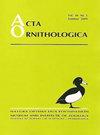小型植食性海鸟,长尾小鹦鹉,小海雀,种群分化的遗传和形态特征,加强了种群结构与迁徙策略之间的联系
IF 1.3
4区 生物学
Q3 ORNITHOLOGY
引用次数: 0
摘要
摘要种群遗传结构的研究是深入了解物种生物学的基础,但其形成机制和影响因素尚不清楚。本文分析了北太平洋小型殖民地海鸟鹦鹉小海雀(Aethia psittacula)的种群分化,该物种以前被认为是一种单态物种。我们将结果与同属种的数据进行比较,探讨影响伊氏蜱种群分化过程的最重要因素。我们分析了六个长尾小鹦鹉种群的形态测量、线粒体DNA控制区片段和微卫星位点。虽然微卫星变异性分析的结果没有揭示不同种群之间的差异,但对照区变异性和形态测量学分析的结果证明,阿留申群岛和其他地区的鸟类之间存在轻微但显著的差异。在大多数测量的线性参数中,它们明显更小,并且具有更高的身体状况(以比例质量指数表示)。mtDNA分析结果和不同类型遗传标记之间的差异表明,来自阿留申群岛的鸟类和来自其繁殖范围其他地区的鸟类可能来自不同的避难地,它们之间的线粒体谱系分化发生在大约10万年前。本研究结果和同属种的比较结果表明,觅食和迁徙模式似乎决定了小浮游食性酸虫的种群结构,高流动性物种具有泛混性,常驻物种具有明显的种群分化,而分散性更强的物种具有中间种群分化。本文章由计算机程序翻译,如有差异,请以英文原文为准。
Signs of Genetic and Morphometric Population Differentiation in Small Planctivorous Seabird, Parakeet Auklet Aethia psittacula, Reinforces Linkage between Population Structure and Migratory Strategy
Abstract. Study of population genetic structure is essential for insight in species biology, but mechanisms of its formation and factors influencing it remain insufficiently understood. Here we analyzed differentiation among populations in small colonial seabird of North Pacific, the Parakeet Auklet Aethia psittacula, which was previously considered as a monomorphic species. We compare our results with data on congeneric species to investigate the most important factors affecting the process of population differentiation in Aethini. We analyzed morphometric measurements, mitochondrial DNA control region fragment and microsatellite loci from six Parakeet Auklet colonies spanning the breeding range. Although results of microsatellite variability analysis did not reveal differences between birds from different colonies, results of control region variability and morphometric analyses testified for a slight but significant differentiation between birds from the Aleutian Islands and other parts of their range. They were significantly smaller in most linear parameters measured and had higher body condition (expressed as the scaled mass index). The results of mtDNA analysis and discrepancy between different types of genetic markers indicated that birds from Aleutian Islands and from the other parts of their breeding range probably originated from different refuges and the differentiation of mitochondrial lineages between them took place around 100 000 years ago. Our results and conclusions from the comparison with congeneric species indicated that foraging and migration patterns seem to determine population structure in small planktivorous alcids, with panmixia in highly mobile species, clear population differentiation in resident species and intermediate population differentiation in more dispersive species.
求助全文
通过发布文献求助,成功后即可免费获取论文全文。
去求助
来源期刊

Acta Ornithologica
生物-鸟类学
CiteScore
2.10
自引率
0.00%
发文量
14
审稿时长
>12 weeks
期刊介绍:
Publishes scientific papers (original research reports, reviews, short notes, etc.) and announcements from all fields of ornithology. All manuscripts are peer-reviewed.
Established in 1933 as Acta Ornithologica Musei Zoologici Polonici, since 1953 continued under the present title.
Published twice a year by the Natura Optima Dux Foundation under the auspices of the Museum and Institute of Zoology, Polish Academy of Sciences.
 求助内容:
求助内容: 应助结果提醒方式:
应助结果提醒方式:


